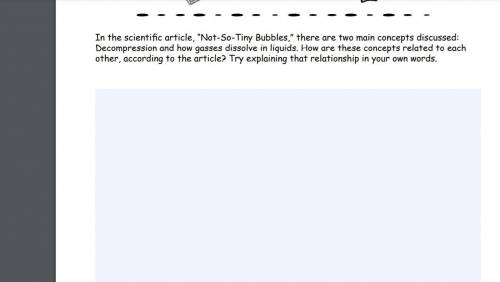
English, 26.02.2021 17:10 glowbaby123
Deep Sea diving was invented about the time that scientists figured out why bridge builders got sick after working in underwater rooms called caissons. Deep sea divers were also suffering from decompression sickness. Rising slowly to the surface was helpful, but it turns out that diving is more complicated than working in a caisson. Divers go up and down to different depths, and they stay there for various lengths of time. Divers needed better information so they would not get "the bends."
Before we look at how scientists helped divers avoid getting sick, let’s look more closely at the concept of decompression—so that we understand why bubbles form in a diver’s blood. Think of a bottle of soda pop. Before it is opened, there is no sign of bubbles. As soon as the bottle is opened, though, bubbles suddenly appear. In fact, they can foam all over the place. That is because there is a gas, carbon dioxide, dissolved inside the liquid soda. The soda in the closed bottle is under pressure. When a liquid is under pressure, it can dissolve more gas than when it is not under pressure. As soon as you open a bottle, there is less pressure inside it, and it cannot dissolve as much gas. That makes gas bubbles form as the gas tries to expand. This same process is what happened when a bubble formed in the eye of the snake in Robert Boyle’s bell jar. It is also what happened to the workers in the caissons.
How do you keep a bottle of soda pop from spraying all over the place when you open it? You open it very slowly and carefully. When you do, the pressure is released slowly. Some gas can come out of bottle slowly, without forming bubbles. The same thing happens in our body, although the gas is not carbon dioxide. Most of the air we breathe is nitrogen, which our body does not use. When the men were under 200 feet of water, they were breathing air under pressure. Every breath they took was packed with extra nitrogen. This extra nitrogen dissolved in their bodies. When the caissons were brought up quickly, the nitrogen came out of its liquid solution and formed bubbles inside the workers’ blood. Bringing the caissons up slowly was like opening a bottle of soda pop slowly—it let the nitrogen gasses leave the bloodstream slowly, without forming large bubbles.
In order to use this information to help divers, another scientist, John Haldane, did experiments with goats under pressure. In 1907 he made a set of tables based on his research. Divers could look at the tables to see how they should ascend to the surface, depending upon how deep they had been and how long they had stayed there. Haldane learned that ascending slowly was not the best way to do it. It was better to go quickly a certain distance and then stop for a while. His tables showed divers how to do “decompression stops” when they ascended.
Even now, no one is absolutely sure they know how DCS happens. They are still looking for the best way to prevent it. Scientists have created new tables and computer programs that are widely used. Because of the work of scientists over hundreds of years, DCS is very rare today. The process is still not perfect, but scientists are getting closer and closer. Each scientist learned from the work of the ones who came before him and added more learning. And it all started with a bubble in the eye of a snake. this is the book


Answers: 3


Other questions on the subject: English

English, 21.06.2019 20:30, brandonhu
Multiple ! in this excerpt from act i, scene vi, of macbeth, duncan praises the atmosphere in the castle and the hospitality of his hostess. identify two reasons that these comments are ironic. duncan: this castle hath a pleasant seat: the air nimbly and sweetly recommends itself unto our gentle sense. . . (enter lady macbeth.) duncan: see, see, our honour'd hostess! — the love that follows us sometime is our trouble, which still we as love. herein i teach you how you shall bid god ild us for your pains, and us for your trouble. he will meet his death in the castle, which he considers a pleasant place. his praise for inverness and his hostess, lady macbeth, is deceptive. duncan secretly plans to give macbeth's title to donalbain. the hostess he praises is actually plotting his murder.
Answers: 2


English, 22.06.2019 07:10, teamroper35
Which detail indicates the authors opinion on the incense that this province produces the travel of marco polo
Answers: 1

English, 22.06.2019 08:30, kp2078
Read this line from the poem. and while i thus at random rove what effect does alliteration have in this line? a. it emphasizes the unpredictability of the speaker's pursuit of pleasure. b. it makes the speaker seem fair and impartial. c. it adds a lighthearted tone to the speaker's words. d. it contributes to the sorrowful tone of the poem.
Answers: 1
You know the right answer?
Deep Sea diving was invented about the time that scientists figured out why bridge builders got sick...
Questions in other subjects:


Mathematics, 20.10.2021 01:50








English, 20.10.2021 01:50



